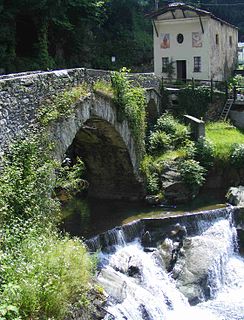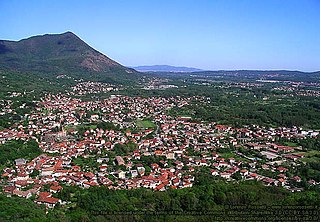| Sparone | ||
|---|---|---|
| Comune | ||
| Comune di Sparone | ||
Castle (Rocca) of King Arduin of Ivrea. | ||
| ||
| Coordinates: 45°25′N7°33′E / 45.417°N 7.550°E | ||
| Country | Italy | |
| Region | Piedmont | |
| Metropolitan city | Turin (TO) | |
| Government | ||
| • Mayor | Anna Bonino | |
| Area | ||
| • Total | 29.5 km2 (11.4 sq mi) | |
| Elevation | 552 m (1,811 ft) | |
| Population (31 December 2012) [1] | ||
| • Total | 1,115 | |
| • Density | 38/km2 (98/sq mi) | |
| Demonym(s) | Sparonesi | |
| Time zone | CET (UTC+1) | |
| • Summer (DST) | CEST (UTC+2) | |
| Postal code | 10080 | |
| Dialing code | 0124 | |
| Patron saint | St. James the Apostle | |
| Saint day | 25 July | |
| Website | Official website | |
Sparone is a comune (municipality) in the Metropolitan City of Turin in the Italian region of Piedmont, located about 40 kilometres (25 mi) northwest of Turin in the Canavese.

The comune is a basic administrative division in Italy, roughly equivalent to a township or municipality.

The Metropolitan City of Turin is a metropolitan city in the Piedmont region, Italy. Its capital is the city of Turin. It replaced the Province of Turin and comprises the city of Turin and 315 other municipalities (comuni). It was first created by the reform of local authorities and then established by the Law 56/2014. It has been officially operative since 1 January 2015.

Italy, officially the Italian Republic, is a country in Europe. Located in the middle of the Mediterranean Sea, Italy shares open land borders with France, Switzerland, Austria, Slovenia and the enclaved microstates San Marino and Vatican City. Italy covers an area of 301,340 km2 (116,350 sq mi) and has a largely temperate seasonal and Mediterranean climate. With around 61 million inhabitants, it is the fourth-most populous EU member state and the most populous country in Southern Europe.
It is home to the Romanesque church of Santa Croce, of medieval origin, which houses several Gothic frescoes.

Romanesque architecture is an architectural style of medieval Europe characterized by semi-circular arches. There is no consensus for the beginning date of the Romanesque style, with proposals ranging from the 6th to the 11th century, this later date being the most commonly held. In the 12th century it developed into the Gothic style, marked by pointed arches. Examples of Romanesque architecture can be found across the continent, making it the first pan-European architectural style since Imperial Roman architecture. The Romanesque style in England is traditionally referred to as Norman architecture.

Gothic art was a style of medieval art that developed in Northern France out of Romanesque art in the 12th century AD, led by the concurrent development of Gothic architecture. It spread to all of Western Europe, and much of Southern and Central Europe, never quite effacing more classical styles in Italy. In the late 14th century, the sophisticated court style of International Gothic developed, which continued to evolve until the late 15th century. In many areas, especially Germany, Late Gothic art continued well into the 16th century, before being subsumed into Renaissance art. Primary media in the Gothic period included sculpture, panel painting, stained glass, fresco and illuminated manuscripts. The easily recognizable shifts in architecture from Romanesque to Gothic, and Gothic to Renaissance styles, are typically used to define the periods in art in all media, although in many ways figurative art developed at a different pace.
The communal territory includes several frazioni: Aia di Pietra, Apparè, Barchero, Bisdonio, Bose, Budrer, Calsazio, Ceresetta, Costa, Feilongo, Frachiamo, Nosè, Onzino, Piani, Sommavilla, Torre, and Vasario. [2]
"Frazione" is the Italian name given in administrative law to a type of territorial subdivision of a comune; for other administrative divisions, see municipio, circoscrizione, quartiere. It is cognate to the English word fraction, but in practice is roughly equivalent to "parishes" or "wards" in other countries.

















